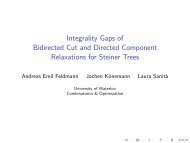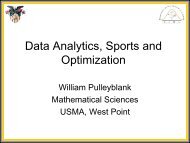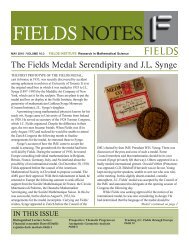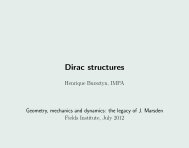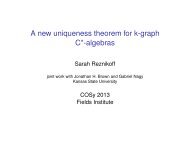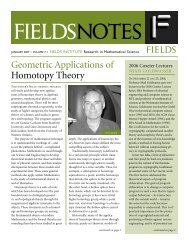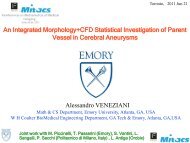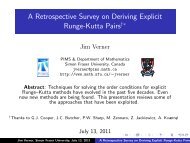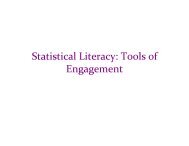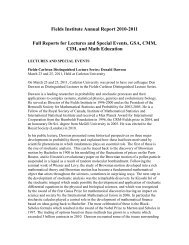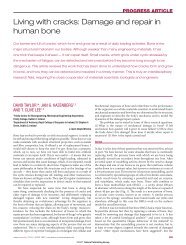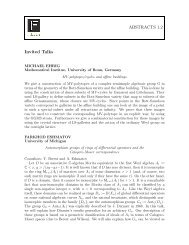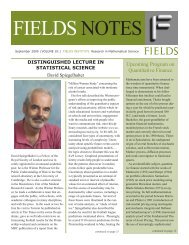Annual Report 2005 - Fields Institute - University of Toronto
Annual Report 2005 - Fields Institute - University of Toronto
Annual Report 2005 - Fields Institute - University of Toronto
You also want an ePaper? Increase the reach of your titles
YUMPU automatically turns print PDFs into web optimized ePapers that Google loves.
Workshop on Mathematical Programming in Data Mining<br />
and Machine Learning<br />
June 1–4, <strong>2005</strong><br />
Held at McMaster <strong>University</strong><br />
Organizing Committee: Nello Cristianini (UC Davis),<br />
Laurent El Ghaoui (UC Berkeley), Jiming Peng (McMaster),<br />
Katya Scheinberg (IBM Research), Romy Shioda (Waterloo)<br />
and Tamás Terlaky (McMaster)<br />
This event is the first international meeting on a new<br />
multi-disciplinary research area: mathematical programming<br />
modeling and problem solving in data mining and<br />
machine learning. The workshop brought together a diverse<br />
group <strong>of</strong> experts from data mining, machine learning and<br />
mathematical programming, working on both theoretical<br />
and applied aspects, to discuss recent research advances,<br />
ignite new collaborations and expose new possibilities. The<br />
framework <strong>of</strong> this medium-scale event provides these<br />
interdisciplinary communities a rare opportunity to expose<br />
each other to the possibilities available in each field, and<br />
identify solution methodologies for problems arising from<br />
their respective areas.<br />
Mathematical programming provides a common language<br />
for many data mining and machine learning problems.<br />
One successful example <strong>of</strong> mathematical programming<br />
in learning is Support Vector Machines (SVMs) based on<br />
the use <strong>of</strong> space mapping via a kernel matrix. SVM, which<br />
can essentially be cast as a convex quadratic optimization<br />
problem, has been developed as the state <strong>of</strong> the art method<br />
for classification. Cluster analysis in pattern recognition<br />
and machine learning usually refers to global (discrete)<br />
optimization techniques.<br />
Programming Workshop participants<br />
G e n e r a l S c i e n t i f i c A c t i v i t i e s<br />
The workshop’s featured 9 plenary talks which covered a<br />
wide range <strong>of</strong> topics from graph modeling and discovering,<br />
techniques for dimension reduction and capacity control,<br />
optimization modeling and problem solving in machine<br />
learning and bioinformatics, to applications <strong>of</strong> data mining<br />
in industry and other disciplines such as biology and<br />
chemistry.<br />
In total there were 33 contributed talks in the workshop<br />
that addressed the same wide range <strong>of</strong> topics as the plenary<br />
talks. All the talks were well received and the organizers<br />
were happy to hear from many participants that the workshop<br />
was very informative and helpful. Motivated by the<br />
success <strong>of</strong> this event, one <strong>of</strong> the invited speakers, Yong Shi<br />
proposed to organize a similar workshop in Beijing, 2006.<br />
During the workshop, the Advanced Optimization Lab in<br />
the Department <strong>of</strong> Computing and S<strong>of</strong>tware at McMaster<br />
<strong>University</strong> presented several posters that demonstrate the<br />
broad applications <strong>of</strong> optimization techniques in different<br />
disciplines. Thanks to the generous support from McMaster<br />
<strong>University</strong>, the <strong>Fields</strong> <strong>Institute</strong>, MITACS and IBM, the<br />
workshop was able to provide financial support for all the<br />
students who gave a presentation in the workshop.<br />
Invited Speakers:<br />
Kristin P. Bennett (Rensselaer Polytechnic Inst.)<br />
Optimization challenges in capacity control<br />
Peter Hammer (Rutgers)<br />
Discrete optimization problems in the logical analysis <strong>of</strong> data<br />
Pierre Hansen (HEC Montreal)<br />
A mathematical programming approach to discovery in graph<br />
theory<br />
<strong>Fields</strong> <strong>Institute</strong> <strong>2005</strong> ANNUAL REPORT 83



